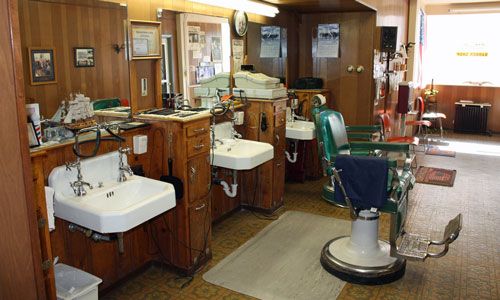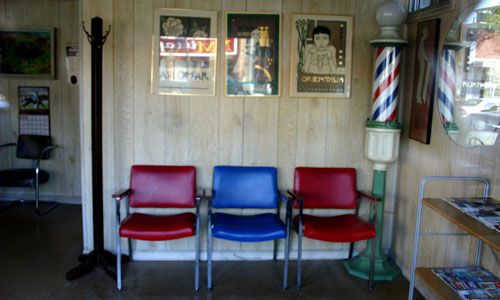A Little off the Top
The average barber shop or hair salon for some reason has a major aversion to credit cards despite their wide use. Blame the economics of being a barber.
80%

(Photo by Randy von Liski/Flickr)
Many businesses rent buildings. Many hair stylists rent chairs.
To understand the issues that lead many barber shops to skip credit cards, it's important to understand the big differences between your traditional restaurant or retail outlet and most independent hair salons.
Despite the fact that barber shops function similarly to retail outlets—a person comes in, orders something, and receives the service in question—the average barber or hair stylist gets paid using a system that's closer to a taxi driver or freelance employee.
And this breaks down by putting the hair stylist in a spot which requires them to either rent out a chair for a flat fee each month, or pay a significant share of their earnings to the salon owner. Like an Uber driver, the people who make the most money at a hair salon or barber shop are the ones who are the most active and have the best rating.
(It should be noted that this isn't the case at chains like SuperCuts, where payment structures tend to be comparable to a low-wage retail gig. Perhaps this is why you'll never have a problem using a credit card, or even a gift card, at SuperCuts.)
Jay the Barber, a prominent NYC-based hair stylist known for his Barber Quest instructional DVDs, says that it generally makes sense for barbers who are new to the business to insist on a commission-based rate, in part because it takes time to build up clients.
Once you've managed to to build up a name for yourself, renting becomes the best option available. That said, renting a building in a large city tends to be expensive, meaning that it can be a challenge to cover basic costs by simply accepting rent. So not every salon offers the option.
"If they do rent chairs, renting chairs is the way to go because you make more money," Jay said in a 2012 YouTube clip on the issue.
It's this somewhat convoluted business structure that creates problems when it comes to credit cards.
"Tax evasion is relatively common, especially among both-rental salon workers. For example, to avoid paying costly payroll taxes on one or two employees, owners will sometimes make arrangements with the employees to pay them a higher wage in exchange for keeping things 'under the table' or for accepting a subcontractor form 1099 at the end of the year that defines the employee as working on a peer-job basis."
— A notable passage from the dramatically named 2015 academic paper Sex, Drugs, and Deception: Deviance in the Hair Salon Industry. The paper, which highlights a number of other questionable elements of the hair salon world, nonetheless adds a valid point to the hair stylist equation—if a salon was only requiring its patrons to pay in cash, it would be easier to avoid paying taxes on the income they receive. Oh yeah, it'd also be easier to launder money if they wanted to. Not saying that many salons are doing so like the authors are suggesting, but they certainly could. (Worth noting: one of the authors of this study, Keene State College's Angela Barlow, worked in this industry for more than two decades, so she has some first-hand experience on how the industry works.)

(photo by dotpolka/Flickr)
The role transaction fees play for barber shops
The credit card situation highlights an interesting dichotomy for hair stylists. Because the way that they get paid is so direct, they more acutely feel the pain of accepting credit cards than CVS or Old Navy might. (Not that CVS or Old Navy are particularly happy with those fees—just take a look at the drama this long-running lawsuit has raised—but they work at such a large scale that the cost-benefit ratio is pretty high.)
Doing some barber shop math here: If you charge $20 for your average haircut and do about 15 haircuts per day, five days a week, that's $1,500 a week, or $6,000 per month. Let's say that you're working a commission deal with the barber shop at a 60/40 split—so the breakdown for you is that you're getting 60 percent of $72,000.
You'll most likely get tips, and you'll have slow and busy days, but if we go for an average of 15 people per day, you're making $43,200 per year, before taxes. (And that may be a little on the high end of things; the Bureau of Labor Statistics puts the average barber wage at $28,800 per year.)
You'll probably have to buy some supplies with that money, such as a fresh set of hair clippers, a broom, and some Barbicide to ensure that you're offering your customers sanitary cuts. Those supplies will add up and probably take a big chunk out of what you're making, but you have to start somewhere.
Now, talking in credit terms, if you're working through Costco to buy your supplies—which is quite likely—you might see their Elavon payment processing service and think, hey, this might be a good idea. But then you do the math. For each transaction, you're paying 1.22 percent to the payment processor for each $20 transaction, on top of a 12-cent charge for each card swipe.
The device you'd be buying? That costs $459—which effectively adds another 12 cents to each transaction until the device is paid off. And even after you pay off the device, it comes with maintenance costs; devices break, need paper, stuff like that.
So for each transaction you make, you're paying around 48 cents, which doesn't sound like a lot, but then you do the math—that cost is $1,728 per year, or nearly what you'd take home after a two-week period. You're already running on a relatively tight budget, so that extra cost is felt a little more acutely than if you're running a much larger business.
You could always go with something like Square, where the device is cheap or free, but the fees there are actually a bit more painful—2.75 percent for each transaction, or 55 cents per haircut. That's $2,145 out of your pocket each year. That sucks.
But here's the question I have: How many potential customers walk out of a salon after finding out that they can't charge their haircut, and they don't want to be on the hook for a potential charge of $2 or more from the no-name ATM in the corner? (Disclosure: Part of the reason I'm writing this is because I'm that guy.)
If the answer to that question is just one per day, that one person whose hair can now be cut more than makes up for the lost costs of accepting a credit card. It requires the barber to stay a little bit longer, but that value proposition of the credit card pays for itself right away, more than covering the additional costs incurred by the 50 cents you're losing for each customer—and then some.
And hey, you make more money by admitting that the customer is right.
Still though, I admit that I do get the reason why hair stylists might get frustrated about this state of affairs.
As I was researching this post, I ran into a Quora page that featured people attempting to answer the basic question about why so many barber shops don't accept credit cards. The response that stuck with me most was an anonymous comment left by a hair salon owner who said that they had stopped allowing customers to tip with their credit cards.
Their reasoning? Because the tips go through a payment processor rather than directly to the stylist, this leads to tips getting paid out of the till, and those tips have to suddenly be taxed and reported. This state of affairs, the person explains, leaves the facility more open to auditing and financial headaches that could hurt the business.
"[It's] not worth losing my business for someone who is to lazy to bring $5 to $20 in cash for a tip when they know they are coming to the salon to get their services, they made the appointment," the anonymous author wrote. "Why should I have to lose money just because it's easier to flash it on the card?"
The thing is, a lot of people would rather never have to carry cash, but the salons and barber shops of the world are working on such tight margins that credit cards just make their lives a real pain in the butt. The real solution here might be a little more flexibility for small businesses, who don't have the time to deal with bureaucracy like this.
Either that, or we could just cut our own hair.
:format(jpeg)/2018/01/qvuuiqvnfhbzzcfrdxzh.gif)
/2018/01/qvuuiqvnfhbzzcfrdxzh.gif)

/uploads/ernie_crop.jpg)